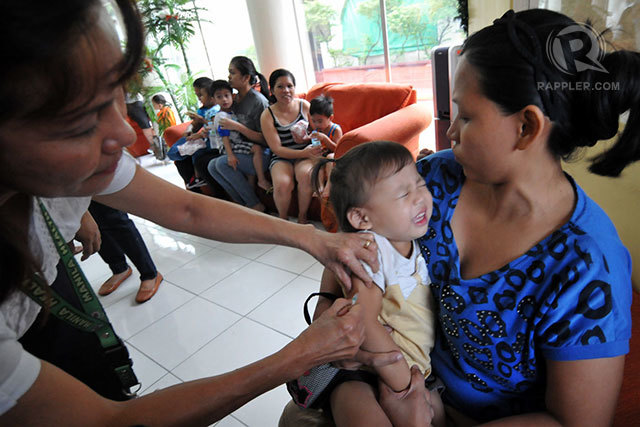
MANILA, Philippines – Vaccination programs in the Philippines are placed under the spotlight because of the ongoing Dengvaxia controversy.
Health Secretary Francisco Duque III and medical experts from the University of the Philippines-Philippine General Hospital (UP-PGH) on Tuesday, February 6, said that there was no reason to panic amid the alleged deaths of children who were vaccinated.
Responding to reports received that there were now parents who rejected the administration of proven vaccines to their children, Duque appealed to groups to not fan massive hysteria among the public.
In December 2017, the Health Secretary also hoped that the issue on the dengue vaccine will not affect the progress of DOH’s Expanded Program on Immunization (EPI), adding that vaccines have “prevented numerous or countless numbers of deaths.”
Ensure access to vaccines
Established in 1976 through Presidential Decree 996, the Expanded Program on Immunization seeks to ensure that children, particularly infants, and their mothers have access to vaccines recommended for their age to prevent specific diseases.
By providing them access to vaccines, the program aims to decrease the morbidity and mortality among children.
When the program was first rolled out, the vaccine-preventable diseases include tuberculosis, diphtheria, tetanus, pertussis, poliomyelitis, measles and rubella.
In 2011, through Republic Act No. 10152, the mandatory basic immunization now covers:
- Tuberculosis
- Diphtheria, tetanus and pertussis
- Poliomyelitis
- Measles
- Mumps
- Rubella or German measles
- Hepatitis-B
- H. Influenza type B (HIB)
Because of the active campaign on vaccination, the number of cases of certain diseases have decrease in recent years. For example, the last case of wild poliovirus in the country was reported in 1993.
Reaching every barangay
Under the law, any “physicians, nurse, midwives, nursing aide, or skilled birth attendant” present during the delivery of a newborn are required to inform parents or legal guardians of the “availability, nature, and benefits” of immunizations against vaccine-preventable diseases at birth.
The mandatory basic immunization is given free at any government hospital or health center for children up to 5 years old.
Vaccine against Hepatitis-B, meanwhile, should be administered to an infant without 24 hours after birth. Subsequent doses shall be completed according to the recommended schedule as provided by the DOH.

In 2004, the DOH introduced the Reaching Every Barangay (REB) strategy which aimed to improve the access to routine immunization and reduce drop-outs in the program.
All health centers are required to have at least one staff trained to follow through with this strategy which includes collating data on vaccinated children, strengthening links between the community and the health sector, and supportive supervision, among others.
The REB is just one of the strategies the health department deployed to ensure that each child in the Philippines is vaccinated. Another strategy is the Supplemental Immunization Activity (SIA) which targets children who did not develop sufficient immunity.
Under its 2018 budget of P107.3 billion, P7.43 billion of which will be used for public vaccination program that targets full immunization of 2.7 million infants while, 2.7 million pregnant women will receive tetanus vaccine.
Don’t be afraid
The Dengvaxia mess has led to more and more parents refusing to avail the government’s various vaccination program, according to DOH.
A total of 58 doctors and scientists, in a statement, expressed dismay that “unsubstantiated” claims over the Dengvaxia dengue vaccine is discouraging parents from availing of other government immunization programs for their children.
On February 2, Health Undersecretary Enrique Domingo said that only about 60% of Filipino children are getting scheduled vaccines – below the health department’s annual vaccination target of around 85%.
Citing the measles outbreak in Davao City, he implored parents that the problems with Dengvaxia should not affect other vaccines.
“[Ito ay] dahil napakarami nating bakuna na magpoprotekta sa anak ninyo, sa polio, sa diphtheria, sa tigdas, sa tetanus. Mga tried and tested po ito at kailangan maibigay ito sa ating mga anak,” Domingo said.
(This is because we have countless other vaccines that can protect your child from polio, diphtheria, measles, and tetanus. They are tried and tested, and it is vital that your children get them.)
As response to the “mess,” Duque said that the marching orders for health department personnel is to "not give up."
"They have to continue to convince parents that these innocent vaccines continue to provide sufficient protection," he said on Monday, February 5.
Senate President Pro-Tempore Ralph Recto, meanwhile, urged DOH to use its P634-million advertising budget to fight vaccine fake news. – Rappler.com







